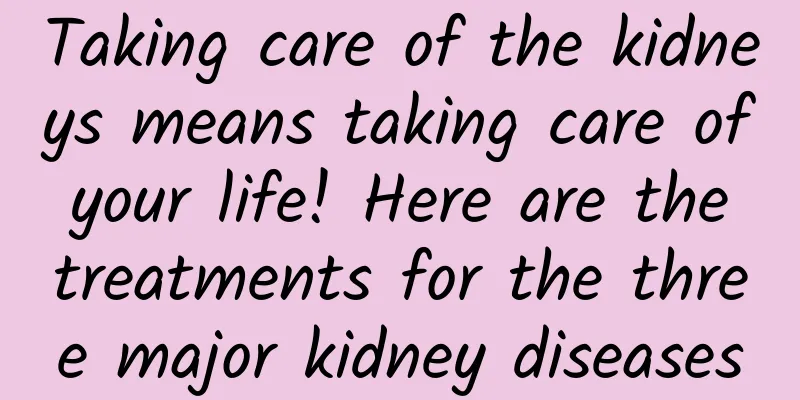Taking care of the kidneys means taking care of your life! Here are the treatments for the three major kidney diseases

|
In traditional Chinese medicine, the kidneys include the human nervous system, endocrine system, reproductive system, and urinary system, and are closely related to our growth, development, aging, intelligence, and fertility. The kidneys are the "innate foundation" of the human body. Once the kidney function is abnormal, it will lead to kidney diseases such as chronic glomerulonephritis, nephrotic syndrome, uremia, etc., and the entire body and even life expectancy will be affected! Chronic Glomerulonephritis General principle: The main goal of the treatment of chronic glomerulonephritis should be to prevent or delay the deterioration of renal function and prevent serious complications. 1. Actively control hypertension and urine protein. Hypertension and urine protein are important factors that accelerate glomerular sclerosis and promote the deterioration of renal function. Actively controlling hypertension and reducing urine protein are two important links. 2. Limit the intake of protein and phosphorus. Patients with renal insufficiency should limit the intake of protein and phosphorus, adopt a high-quality low-protein diet, less than 0.6 grams per kilogram per day, or add alpha-keto acids or essential amino acids. 3. Avoid factors that may cause worsening of renal function. In addition, patients should avoid infection, fatigue, pregnancy and uremic drugs, such as aminoglycoside antibiotics, traditional Chinese medicine containing aristolochic acid, etc., which may cause worsening of renal function. Nephrotic syndrome Patients with severe edema and hypoproteinemia should rest in bed and receive general or symptomatic treatment such as low salt and diuretic therapy. 1. Immunosuppressants Nephrotic syndrome is an immune inflammatory disease caused by impaired cellular or humoral immunity, so immunosuppressants are often used for treatment. 2. Glucocorticoids Glucocorticoids are also used for kidney diseases. The common dose is mainly for anti-inflammatory effects. There are many schemes for the treatment of nephrotic syndrome with glucocorticoids and immunosuppressants. In principle, it is advisable to enhance the efficacy while minimizing its side effects. 3. Angiotensin converting enzyme inhibitors or angiotensin II receptor antagonists Angiotensin converting enzyme inhibitors, also known as ACEI, or angiotensin II receptor antagonists, also known as ARBs, are commonly used in recent years to reduce urinary protein and can also play a certain role. Uremia The treatment of uremia is mainly through renal replacement therapy, namely hemodialysis, peritoneal dialysis and kidney transplantation. 1. Kidney transplantation is the most successful and effective replacement therapy for vital organ failure. As long as the treatment is scientific and standardized, people can still survive for many years. Kidney transplantation is to implant a kidney from a donor into the recipient through surgery to restore kidney function. Currently, kidney transplantation surgery has become relatively mature and standardized. 2. Hemodialysis Hemodialysis, also known as artificial kidney, is one of the most widely used treatments for uremia. The treatment method is to introduce the patient's blood and dialysate into the dialyzer at the same time to remove uremic toxins and excess water in the blood. 3. Peritoneal dialysis Peritoneal dialysis uses the human peritoneum as a dialysis membrane to purify blood. After the dialysate is introduced into the abdominal cavity, toxins and excess water in the blood pass through the peritoneum into the dialysate in the abdominal cavity and are then excreted from the body. In many dialysis centers in China, the survival period of patients with uremia has reached more than 10 to 20 years, and there are even reports of more than 30 years in foreign countries. Therefore, uremia is not terrible, as long as it is treated scientifically, you can still live a quality life. The management of related internal medicine problems is the key to influencing the patient's long-term survival rate. In addition, actively solving the shortage of kidney supply and allowing more end-stage renal disease patients to benefit is a pressing issue currently faced. |
<<: What is "non-Hodgkin's lymphoma"? It is the bad guy who took Xiong Dun away
>>: How to eat delicious and healthy food during the May Day holiday
Recommend
What is the difference between cream top and milk cap? What does milk cap taste like?
The milk cap combines the characteristics of dess...
Female urine routine occult blood 1 plus sign
If a woman has a plus sign for occult blood in he...
Why are there some expensive and some cheap beauty eggs? What are the disadvantages of cheap beauty eggs?
We can find many different brands and prices of b...
Menstrual regulation and pregnancy pills soften the fallopian tubes
I believe everyone knows that the fallopian tubes...
Why haven't I gotten pregnant after trying for so long?
If you simply cannot conceive, you should go to t...
What to eat after hysterectomy
For friends who have just had their hysterectomy,...
Does threatened miscarriage cause stomach pain?
Threatened abortion is a problem that many women ...
Symptoms of cold stomach and spleen deficiency in women
It is very common for women to have cold stomach ...
Myocardial ischemia in young women
We often hear the term myocardial ischemia. The f...
What flowers can be grown with indoor diffuse light? What does diffuse light look like for growing flowers?
Many people like to grow flowers and plants indoo...
What to do if your stratum corneum is thin and your skin is dry? Six ways to improve your stratum corneum
Many people think that thin stratum corneum is dif...
Why do women's underwear turn yellow?
Female friends must pay attention to their privat...
Is it normal to have breast tenderness before your period?
It is very common for women to experience breast ...
How many varieties of jackfruit are there? How to tell if jackfruit is ripe?
Jackfruit has thick flesh, golden yellow color, t...
What is the story of the squid strips that I discovered by chance? The actor of the squid strips that I discovered by chance
Does Squid look familiar in "A Day Found by ...









